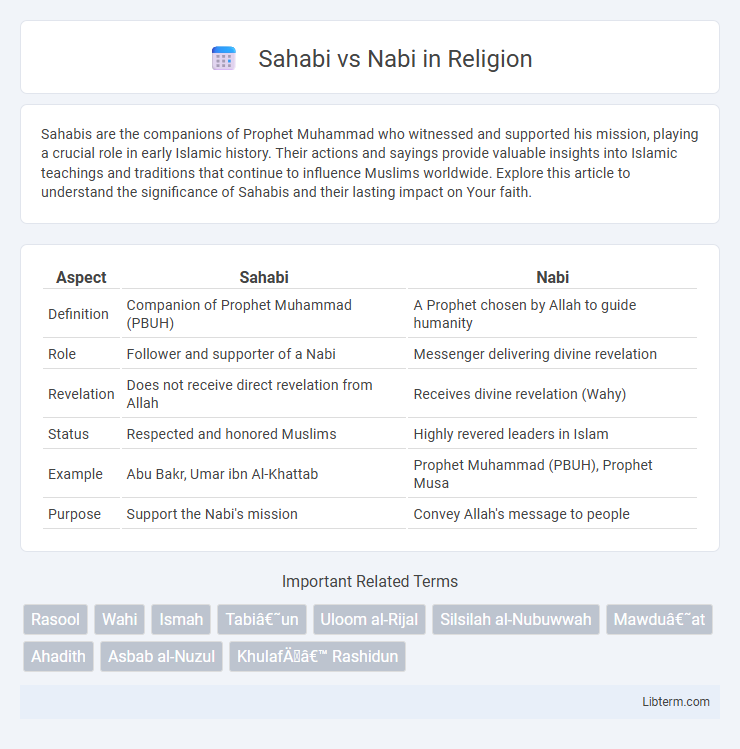Sahabis are the companions of Prophet Muhammad who witnessed and supported his mission, playing a crucial role in early Islamic history. Their actions and sayings provide valuable insights into Islamic teachings and traditions that continue to influence Muslims worldwide. Explore this article to understand the significance of Sahabis and their lasting impact on Your faith.
Table of Comparison
| Aspect | Sahabi | Nabi |
|---|---|---|
| Definition | Companion of Prophet Muhammad (PBUH) | A Prophet chosen by Allah to guide humanity |
| Role | Follower and supporter of a Nabi | Messenger delivering divine revelation |
| Revelation | Does not receive direct revelation from Allah | Receives divine revelation (Wahy) |
| Status | Respected and honored Muslims | Highly revered leaders in Islam |
| Example | Abu Bakr, Umar ibn Al-Khattab | Prophet Muhammad (PBUH), Prophet Musa |
| Purpose | Support the Nabi's mission | Convey Allah's message to people |
Defining Sahabi and Nabi: Key Concepts
A Nabi is a prophet chosen by Allah to deliver His divine revelation and guide humanity according to Islamic teachings, whereas a Sahabi is a companion of the Prophet Muhammad who personally met him, embraced Islam, and supported his mission. The primary distinction lies in the role; a Nabi receives direct divine communication to convey God's message, while a Sahabi witnesses and assists in the practical implementation of that message. Understanding these key concepts clarifies the hierarchical relationship between prophethood and companionship in Islamic theology.
Historical Background of Sahabi and Nabi
Nabi refers to a prophet chosen by Allah to convey His divine message, with Muhammad being the final Nabi in Islamic tradition. Sahabi are the companions of the Nabi who directly met, supported, and followed the Prophet Muhammad during his lifetime. The historical background of Sahabi is rooted in early Islamic history, where their firsthand experiences and narrations of Hadith serve as vital sources of Islamic teachings and practices.
Criteria for Being a Sahabi
A Sahabi is defined by having met the Prophet Muhammad (PBUH), embraced Islam during his lifetime, and died as a Muslim. This direct interaction and faith commitment distinguish Sahabah from other early Muslims. In contrast, a Nabi is a prophet chosen by Allah to receive divine revelation, with a unique role in guiding believers.
The Role and Mission of a Nabi
A Nabi (Prophet) serves as a divine messenger chosen by Allah to deliver revelation and guide humanity according to God's commands. Unlike Sahabis (companions) who support and follow the Nabi, the Nabi possesses the unique mission of communicating divine laws, moral teachings, and future guidance to establish and maintain the spiritual foundation of the Islamic faith. This role involves receiving direct revelation through Wahi (inspiration) and acting as a model for righteous behavior, ensuring the propagation and preservation of God's message across generations.
Differences in Spiritual Status: Sahabi vs Nabi
Nabi, or prophets, possess the highest spiritual status as they receive direct revelation from Allah and serve as divinely appointed messengers to guide humanity, while Sahabi, or companions, are revered followers who supported and learned from these prophets but did not receive revelation themselves. Prophets embody infallibility (Ismah) in conveying God's message, whereas Sahabah hold esteemed ranks through their faith, dedication, and proximity to the prophetic mission. The distinction in spiritual status highlights the unique role of Nabi as divinely chosen leaders and the Sahabi as honored believers contributing to the preservation and propagation of the divine message.
Responsibilities and Duties Compared
Sahabi, or companions of the Prophet Muhammad, were responsible for supporting and spreading his teachings, transmitting Hadiths, and preserving Islamic traditions. Nabi, or prophets, carried the divine duty of receiving and conveying Allah's revelations, guiding their communities through divine laws and moral principles. While Sahabah executed the propagation and application of prophetic guidance, Nabis held the primary role of delivering God's message and serving as exemplary models of faith and obedience.
Sahabah’s Relationship with the Prophet
Sahabah, or companions of the Prophet Muhammad, played a crucial role in the early Islamic community by closely following and supporting the Nabi, Prophet Muhammad, in spreading Islam. Their intimate relationship involved not only companionship but also active participation in battles, preserving Hadith, and implementing the Prophet's teachings. This close bond enabled the transmission of authentic religious knowledge and helped establish the foundation of the Muslim ummah.
Nabi in the Lineage of Prophethood
A Nabi is a prophet chosen by Allah to convey His divine message and guidance, serving as a critical link in the lineage of prophethood that preserves spiritual and moral teachings. Unlike Sahabis, who are companions and followers of the Prophet Muhammad, a Nabi holds the unique status of receiving direct revelation and prophethood. This distinction underscores the foundational role of a Nabi in establishing and continuing the divine mission throughout Islamic history.
Notable Figures: Examples of Sahabah and Anbiya
Notable Sahabah include luminaries like Abu Bakr, Umar ibn al-Khattab, and Ali ibn Abi Talib, who were direct companions and disciples of Prophet Muhammad, playing crucial roles in early Islamic history. Prominent Anbiya (prophets) include figures such as Prophet Muhammad, Isa (Jesus), Musa (Moses), and Ibrahim (Abraham), who conveyed divine revelation and guidance to humanity. The key distinction lies in Prophets (Anbiya) being recipients of divine revelation, while Sahabah were followers and supporters of the Prophet Muhammad without prophethood themselves.
Importance of Understanding Sahabi vs Nabi in Islam
Understanding the distinction between Sahabi and Nabi is crucial in Islam as it clarifies the roles and significance of these figures; a Nabi is a prophet chosen by Allah to convey divine revelation, while a Sahabi is a companion of the Prophet Muhammad who supports and preserves his teachings. This differentiation enhances the comprehension of Islamic history and theology, emphasizing the unique status and responsibilities of prophets compared to their followers. Recognizing these roles aids Muslims in honoring prophetic guidance while valuing the Sahabah's contributions to the spread and preservation of Islam.
Sahabi Infographic

 libterm.com
libterm.com